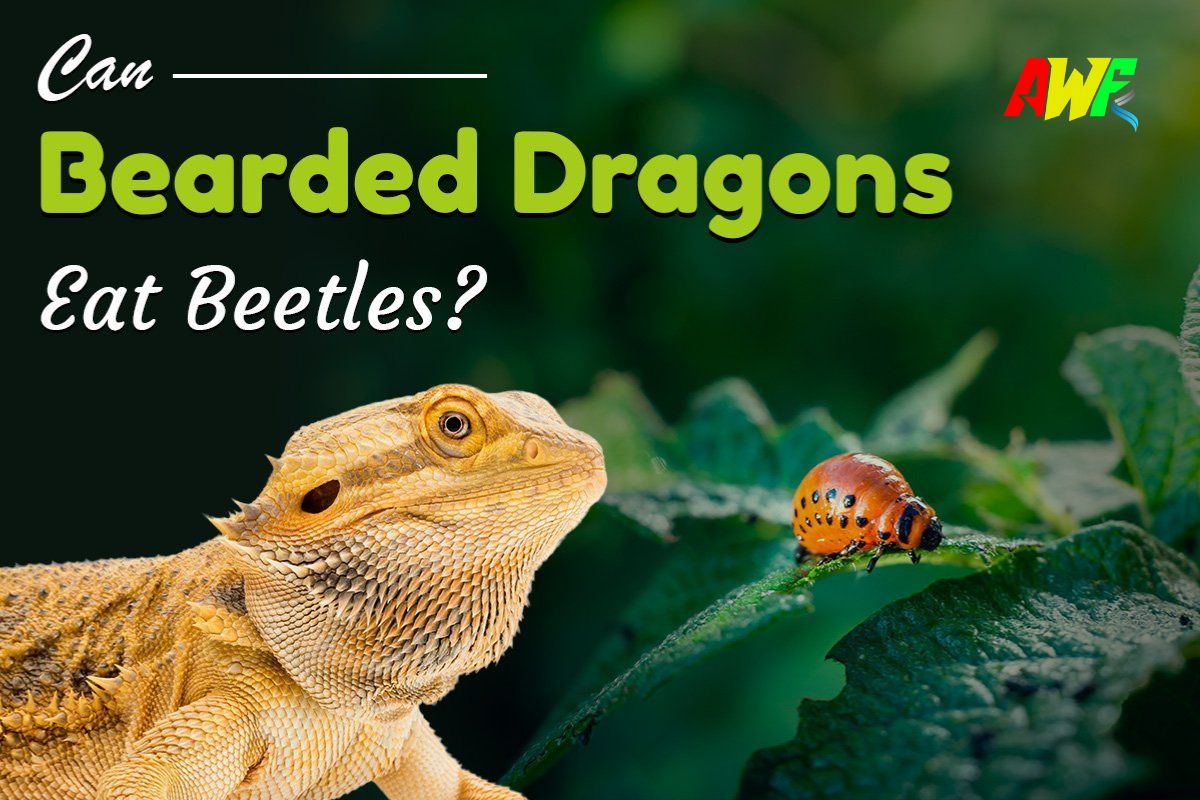
Adult dragons primarily eat vegetables and fruits, with up to half of their diet of insects. But can bearded dragons eat beetles? A wide variety of beetles and beetle larvae are available for your bearded dragon, but it’s crucial to ensure you’re offering only safe beetles. Their diet should also remain balanced to prevent any health issues related to nutrition.
Can Bearded Dragons Eat Beetles?
Yes, bearded dragons can eat beetles, but only in moderation. Their diet primarily consists of plants, with insects providing necessary animal matter. Insects are a key nutrient source for wild and captive bearded dragons, but not all insects are safe. Some can be toxic, so it’s crucial to research any insect before offering it to your bearded dragon.
There are many types of beetles, and many are safe for bearded dragons to eat. However, always check the specific beetle before feeding it to your pet. Large or complex beetles can be difficult for your bearded dragon to eat and may cause harm instead of providing nutrition. Stick to smaller, softer insects for easier digestion and to avoid stress for your dragon.
How Often Can Bearded Dragons Eat Beetles?
Feeding your bearded dragon one or two beetles as an occasional treat is fine. The safe amount depends on your dragon’s size, weight, overall diet, and the beetle’s type, form, and nutritional content.
Young bearded dragons should have fewer beetles compared to adults. Beetles should not be the primary nutrient source in their diet.
Bearded dragons thrive on a varied diet, getting essential nutrients from multiple food sources. The majority of their food should come from plant matter.
Overfeeding beetles, even in their larval form, can lead to nutritional imbalances. This can result in health issues like constipation, obesity, secondary dietary hyperparathyroidism, or digestive problems.
4 Benefits of Feeding Beetles to Your Bearded Dragons
High Protein Content Aids in Growth
Beetles and mealworms are rich in protein, an essential nutrient for humans and pets. Including beetles in your bearded dragon’s diet can support its growth and development. Protein is crucial for maintaining overall health, making it essential to your pet’s nutrition.
High Fiber Content Prevent Constipation
Fiber is an essential component of a bearded dragon’s diet. Beetles and mealworms are fiber-rich, helping prevent constipation in your pet.
Low Sodium Level Prevent Heart Problems
Avoiding high sodium is essential for a bearded dragon owner, as it can cause health issues. Beetles and mealworms are low in sodium, making them a great food choice for pets with high blood pressure or heart problems.
Other Nutrients for Overall Health
Feeding your bearded dragon beetles offers some nutritional benefits. Beetles contain small amounts of calcium, magnesium, potassium, zinc, copper, and iron, contributing to overall development. While these nutrients are healthy, the quantities are minimal. It may not be worth the effort for your bearded dragon to consume beetles to gain these nutrients.
4 Risks of Feeding Beetles to Bearded Dragons
High-Fat Content Can Cause Diarrhea
Beetles are high in fat, which your bearded dragon requires in small amounts. Too much fat can lead to irregular stools and diarrhea, causing discomfort for your pet.
Beetles May Bite Your Bearded Dragon
Beetles, especially in their larval stage, can bite your bearded dragon. Other insects, such as ants, roaches, and superworms, can also bite. This behavior is a common defense mechanism, posing a risk to you and your bearded dragon.
Beetles Have Tough Exterior
These beetles have developed a tough exterior to protect themselves from predators. If you attempt to feed one to your bearded dragon, you may notice it trying to break through the beetle’s hard shell.
High Phosphorus Levels Prevent Calcium Absorption
Beetles and mealworms have higher phosphorus levels, especially compared to the calcium they offer. This is important because their phosphorus and calcium levels need to maintain a specific ratio for safety, typically 2:1 in favor of calcium. The issue with mealworms is that they don’t keep this ratio, which is why some bearded dragon owners use calcium supplements.
Conclusion
When determining a proper diet for your bearded dragon, you might wonder, “Can bearded dragons eat beetles?” Some insects that bearded dragons eat eventually turn into beetles, which can raise concerns about their diet. While bearded dragons can eat beetles, they are not the best choice for a few reasons. Even in their worm stage, before transforming into beetles, these insects lack the necessary nutrients to sustain your bearded dragon properly.
FAQs
Can bearded dragons eat darkling beetles?
Some darkling beetles are safe for your bearded dragon. They are easier for your bearded dragon to eat in their larval form, but adult darkling beetles have a hard shell that makes them more challenging to consume.
Can bearded dragons eat mealworm beetles?
Yes, bearded dragons can eat mealworm beetles, a darkling beetle.
Can bearded dragons eat superworm beetles?
Bearded dragons can eat superior beetles, but only in their larvae form. Superworm beetles, a darkling beetle, also fall into this category.
Can bearded dragons eat Japanese beetles?
Japanese beetles should not be included in the diet of bearded dragons. These beetles are challenging to eat, which can cause health issues.
Can baby bearded dragons eat beetles?
Feeding beetles to your baby bearded dragon is generally not recommended. Beetles are challenging to eat and digest, even for adult bearded dragons.
